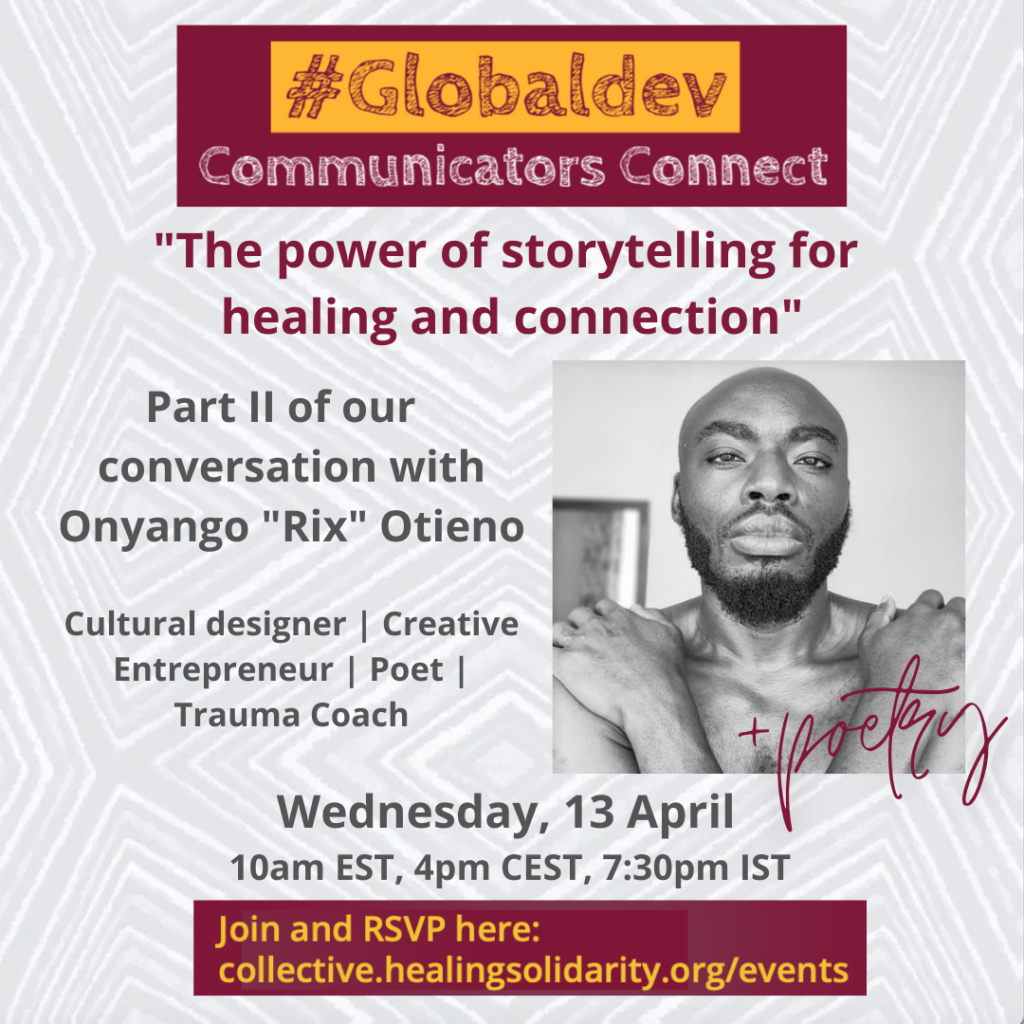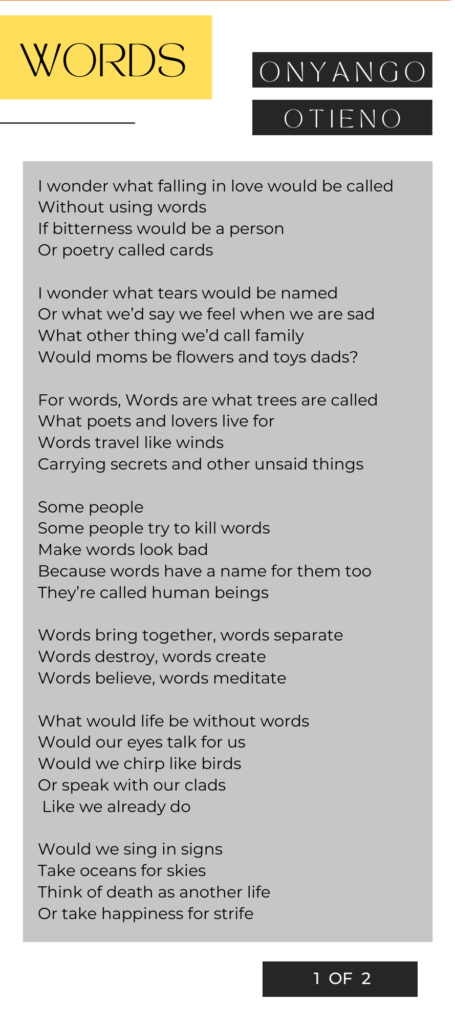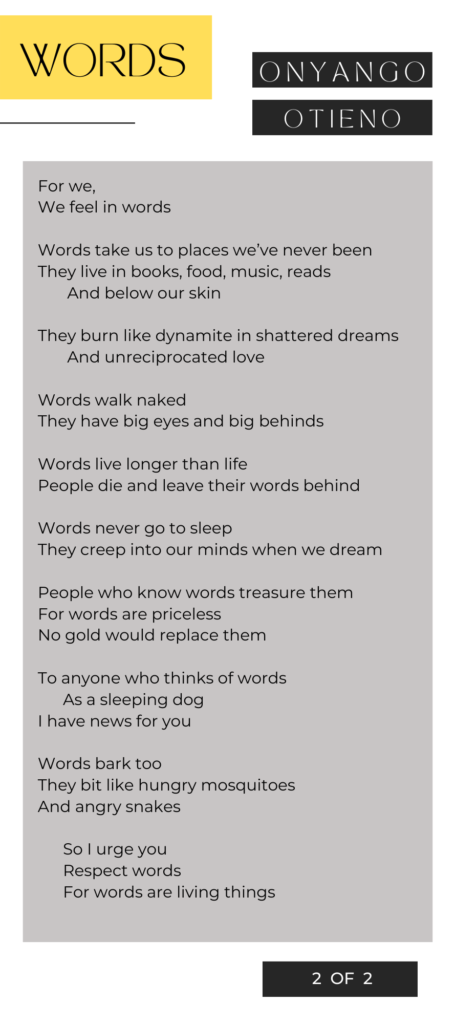
We were so glad and grateful to welcome Onyango Otieno as our special guest in March and April’s #Globaldev Communicators Connect in the Healing Solidarity Collective. Part IV of our interview below shows why. (Click here for Part I, Part II, and Part III of his interview.)
Jennifer Lentfer: So the name of our gathering, as you know, is #Globaldev Communicators Connect. So I did want to ask a little bit about how you’re relating to your role as a nonprofit communications professional. How are you bringing your creativity into your role as a communications manager? And then what advice do you have for us about doing the same?
Onyango Otieno: When I went to school, I was taught that one plus one is two. Those are numbers. Two plus two is four. That’s how it works. Then I was taught that there are these subjects that are important, and others are not very important. So they put some [subjects] above others.
Then I was taught that after you finish primary school, you go to high school, then you go to college, and then you work. And then you’re supposed to marry someone. You’re supposed to have children. And then die. That was the story.
Then there was my identity as a man. This is the script, right? You are supposed to grow to be a strong, tough guy. Hold all your emotions. Boys don’t cry. We are beating you up, but don’t cry. You’re the pillar of society. You’re supposed to be a leader. You are supposed to be the head of the home, priest of the house, and everything in between. So be strong, right? Don’t show your emotions. Keep them in. Okay? That was one identity. Right?
Now, as a religious person, I grew up in a Catholic home. (I’m writing about these stories, actually in a book that should be coming up soon.) There’s a time now I’m supposed to go through what they’ve called catechism. You’re just learning all the essentials of the church to be a full member. I’m thirteen years thereabouts. And so the nun or the sister who’s teaching us about these prayers is going on about the doctrines that were that we were being taught, and I’m struggling to understand. You know, and I have so many questions. But there’s nobody to answer them.
My dad would come back home on Saturday nights drunk, could not walk by himself, and he was carried by his friends. Then on Sunday, he’s making announcements in church, like the holy guy who he’s supposed to be. There are two fathers I was witnessing. I was like, “Who is who?” I’m six years old at the time.
And for some reason, I’m still supposed to understand that the world is black and white. You’re either black or white, literally, or you are a man or a woman, or you’re married or single, you’re educated or not formally. Everything is just boom, boom, black, white, black, white, black, white. But my emotional composition, and my intellectual composition is so complex, really complex, because I’m happy and I’m sad, and I’m in between. I’m sure, and I’m uncertain about other things. Like sometimes I know who I am, sometimes I don’t. My notes in school don’t show that I can be flexible, that in the morning I can be one person, and in the evening I’m someone else.
So what I would say we could bring to the communications space, as somebody who has been here, trying to create myself:
Whenever we have human beings in a space, we don’t have to always follow the rules.
I love co-creation, right? Because there is what the lawyer has learned, there is what the engineer, there is what the mason has learned – anything. When we come together, the challenge is in co-creating knowledge that can be shared, for the purpose of the well being of the space that we are in.
There is what has been there for the longest time, like the basics, and the rules, and everything. Poetry is what made me learn this because we were taught stylistic devices and the structure of a poem and a sonnet and all these things, right? And then there is free verse! You can create what you want, but you understand the rules – you understand this is what a meter is, this is what a stanza is, the rhythm and the rhyming, and all the consonances and alliteration, blah blah blah. But then you decide to develop what’s yours. That’s what I enjoy most. And I bring that to communities:
Can we create what’s ours?
That is among the challenges we’re having even in the mental health space in Africa right now. Because, for the longest time, we did understand psychology, right? And the psychology that we are taught in school is also quite Eurocentric and also quite patriarchal. So to start to develop stories in our homes that will make our mothers understand the mind without using the technical terms. My mother will never understand schizophrenia. But I can put it in a story, and she will get it.
In Zimbabwe, we have people who developed something called the Friendship Bench. They bring very old women, like my grandmother’s age, just ordinary people, and they sit there together and teach each other about depression by talking about their life challenges. They don’t have to know the word depression, but they know what it is. For me, that is, that’s what it’s about. How can we create what is ours, to develop what we want for our own development? If there are things we can borrow, cool, but everybody has something to bring to the table. And that’s why inclusivity is really important in this time and age. It should have been there from the beginning. We should not even be talking about inclusivity. It’s just supposed to be part and parcel of who we are.
I think my artistry [comes from] my experiences growing up in the culture I have grown up in. Anytime in a community, people are given space to express who they are, and their ideas are actually used to co-create something – a work culture or how a relationship should work. Anytime your ideas are taken in to create something as structure, you feel like you’re part and parcel of it. For me, that’s what community management is about. It’s that inclusivity of voices to create what is ours for this space.
The funny thing about humanity is…we all are multifaceted. We also have multi identities. At work, there’s space for work. At home, there is space for home. And the field, there is space for the field.
Can you imagine the joy of having a chance to co-create space in every identity that you have or share with people?
You would feel wholesome! That’s what I’m talking about. Maybe what’s happening today – because people don’t have this and people feel confined in their other spaces of identity of existence – they sort of cling to one place where they can show their might and power. Because it’s a somatic experience, your body still needs the release – you want to show that you are here, and you exist. If your culture shows you that you’re supposed to be dominant, and you’re a man, that’s what you do, right? But if your culture shows you’re supposed to share, then without a doubt, you’re going to find healthy ways to express or to develop space where people can share and that you can share as well.
So that again is what I’m speaking about with cultural designing. How do we help people understand: you don’t have to cling to, you don’t have to dominate, you don’t have to hide, you don’t have to confine yourself. You can fully express yourself, and your ideas could be taken into account and actually contribute to the wellness of a place.
Because life is a moment in space. (This is a line from a roots and reggae musician who sang this.) Now, if you do not have control over this space, then your moment is taken away from you. If you don’t have joy and love in this space, then your moment is taken away from you. So you lose yourself and then you take up somebody else’s identity. So I advocate for wellness from the beginning – in our homes and in our workplaces and in the streets and in our convenience stores and in public transport spaces and in camps, and in our thoughts. That’s what I love to dream.
Jennifer Lentfer: We are dreaming that right now, together. Words hold so much power and they’re ephemeral because they can also disappear. I would love to hear your poem, “Words.”
Onyango Otieno: This is another playful poem that I wrote it some seven years ago. Still feels as good as new. Words, they never die really.


Neha Misra: Hi Onyango! So nice to see you and be together again. What a beautiful, beautiful gift. Onyango, as you were entering this space with us, you said you’re sharing words and you’re sharing energy. I feel it’s so profound – your your presence and and your words – so thank you for that. My question is: I feel words and expression have such an important role in healing, as I have experienced in my life. My relationship with poetry continues to deepen, not just as a as a lover or as a consumer of poetry, but as a channel and a creator. For me, the way poems come to me [has] continued to evolve over a period of time. How do poems arrive to you? And how do you arrive to them?
Onyango Otieno: Good question. How do my poems come? Everything. Sometimes it comes sporadically, sometimes in the morning, sometimes when I’m really sad, sometimes when I’m commissioned to write, sometimes when I’m thinking of something. But I evoke my spirit, whenever I am creating a piece.
Whatever the circumstance, whatever the time, whatever has pushed me to write, it doesn’t matter. I don’t pay attention to that. I pay attention to my spirit.
Because it is that which will give me the words to say what I want to say in the spirit that I want to say it, so that the energy I need to specifically be communicated to get out. So whether I’m speaking to children, whether I’m speaking to adults, whether I’m speaking to space, I go back here [pointing to his chest].
I tell people, anything, we amass on this earth that is physical, we will leave here. But whatever we feel, will go with it. I will go with that. Nobody can ever take that away from me. They can take everything – my house today, people can come take everything that I have here. But what I feel they can never take that away. So I spend a lot of time inside because I need to keep working on it and developing it and just loving it. Because the day I get away from this physical realm of the earth, I will go with what I’m feeling. And I want to go happy and peaceful and joyful. So I go back to that place when I need to write.
Joan Okitoi-Heisig: Where and how do you fill up your creative self? How do you tank up your creative energy?
Onyango Otieno: I love answering that question! Because I think when you’re an artist, there is a particular way sometimes people subconsciously expect you to live your life in a way that could be very structured, that brings your creative juices to you and all that. But I just live my life! I’m very active.
If I showed you my calendar…[holds up mobile phone.] This is the month of April. And this is how my calendar looks like. I’m always doing things. Today before coming, I was from the office, I had a therapy session with someone. I’m always playing football there with the guys. Every Wednesday, we have a group of male poets where we play physical football in town for two hours, and we connect and we bond, you know, just helps us keep sane.
And I’m talking to everybody on Instagram, and on Twitter and on Facebook, from all over the world – every single day. So I’m actually exposed to a lot of things like culture, and politics. There’s so much to take in! And all these people, I’m connecting with them. I’m actively engaging with the world, with the things that mean so much to me.
But then I also take lots of time with myself. Grounding is very important to me. Centering myself is very important to me.
Spiritually, it’s very important to me that I’m always alive in my consciousness and conscious.
And I’m talking to my emotions: What are we feeling? What’s going on right now? Can you decode the language of your body right now? I guess I also just learned to make it a day-to-day thing because as a therapist as well, you need to be present for your clients – you have to be there. And it’s a benefit that I have, because I have to keep working on me. I have to keep going in. Many times when I go in, I find beautiful things, man, like just waiting for me.
“Hey Rix, we’ve been waiting for you to see us. Can we have tea? Can we have coffee?”
So just embodiment of my essence, I think, is how those creative juices come to me. I came across Sufism, and I read a lot of work from the Eastern side of the world because of their simplicity, and just how they embody so much of things I relate to. It also gave me language, because there’s a particular way Rumi writes that I say, “This is talking to me.”
So I really live my life the best way I can. I like to play. Because there was an amount of my childhood that was taken away from me, I say, from the time I became me, I want to play for the rest of my life. When you play, you’re happy. You’re just happy even when you’re going through hard things. You become creative because your mind is always engaged.
That does not mean I don’t have hard days. I do and I go through pain like everybody else. I go through depressive episodes like everybody else. What I love about what I’ve learned is that I nurse those wounds. When I know I need to be around people to be better, I go to my boys. I go to my friends and I spend a weekend at someone else’s home and I’m grateful. Even this morning a friend of mine came here. They’re going to a bonfire and they came to borrow a blanket. I really like those kinds of things – just people knowing one another for ordinary things, you know?
I really say this a lot in as much as I have this social media followings and blah blah blah. In this world, we idolize people who we name celebrities and they have these followings and all that. I like to communicate myself as one of everybody else. I am in among the people. I am not above the people. I am in among the people. It’s because I like telling stories that come from the people – because I’m among them and they’re also coming from me. It’s not from somewhere else, like some other utopian world. They relate my words because I am among them, I live among them. So they are my stories and by extension I become their stories, you know?
So the shortest answer: I live my life.
Jennifer Lentfer: That’s also what we have to go do now everybody!
Thank you, Onyango, for this gift of your time and energy and for your words and for your work. Thank you for living those truths out loud for all of us around the world to connect with and learn from, and to be reminded of our own humanity along the way.
***
Click here for Part I, Part II, and Part III of his interview. You can listen to a recording of Onyango’s March #Globaldev Communicators Connect conversation with Joan Okitoi-Heisig in the Healing Solidarity Collective here.
#GlobalDev Communicators Connect is a monthly meeting created and hosted by Joan Okitoi-Heisig and myself in the Healing Solidarity Collective to support people responsible for external communications in international aid and philanthropy to connect to each other.
On the second Wednesday of each month, we gather to learn from other communicators in the sector, ignite our creativity, and reflect on where/when we personally might be able to take more “risks” to invite change in how our organizations communicate about our work. We dare to invite the uneasy conversations and get inspired by each other.
***
Related Posts
Reimagining Nonprofit Communications in a Hyper-Connected World
Community mobilization vs. organizing: Why are we here?
10 “big picture” communications questions for the social good sector
Rigorous humility: Seeking a healthier relationship with results
“Waiting for a Miracle” and “A Private Miracle” by Neha Misra

